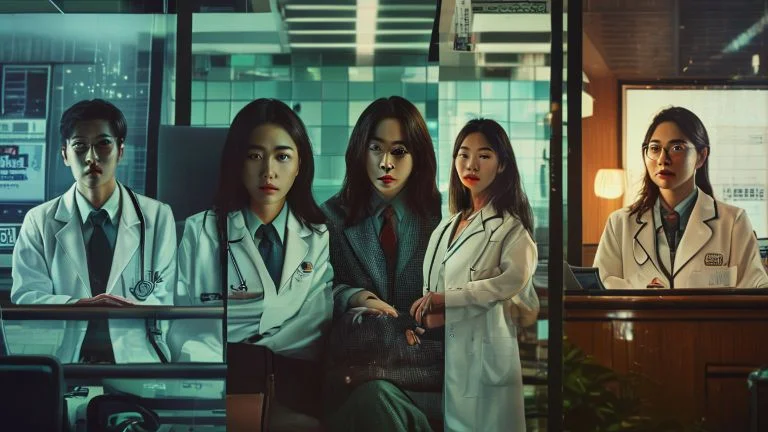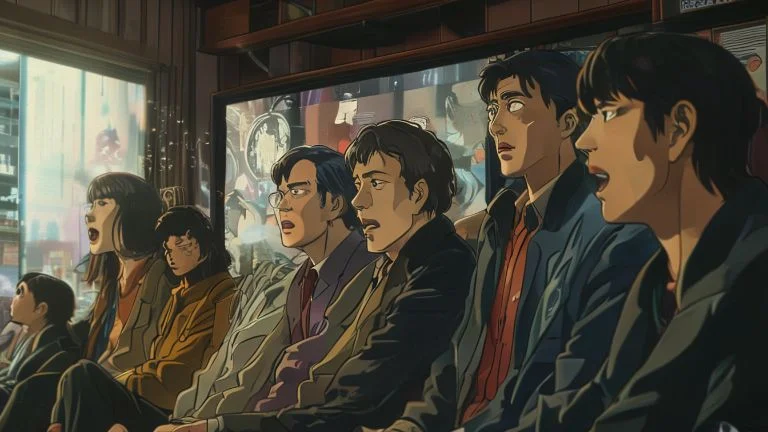
Asian dramas, commonly called 'doramas,' have long transcended their entertainment value to serve as powerful mirrors reflecting societal challenges and cultural narratives. While many viewers seek light-hearted romance or thrilling suspense in these series, some doramas stand out by intricately weaving social commentary into engaging plots that provoke thought and foster empathy. This article will delve into a detailed analysis of top doramas that effectively highlight salient social issues, examining their cultural impact, storytelling techniques, and the realism they bring to complex topics affecting contemporary society. These shows not only entertain but also initiate conversations around oft-overlooked problems, giving audiences a nuanced understanding that transcends the screen. Through carefully constructed characters, authentic settings, and emotionally resonant arcs, these doramas illuminate multifaceted social struggles ranging from mental health and economic disparity to gender roles and systemic discrimination.
Understanding the impact of doramas as social critique involves a thorough exploration of narrative structure, thematic depth, and cultural context. Unlike traditional media formats strictly dedicated to news or documentaries, doramas harness the power of story-driven empathy and character development to humanize social issues, making them accessible and relatable. This method enables viewers from diverse backgrounds to grasp the emotional and psychological dimensions behind statistics and headlines. By dissecting these works, this article clarifies how narrative choices and character portrayals influence perceptions of stigma, policy, and personal responsibility within various societies primarily in South Korea and Japan, where these dramas originate.
Exploring the Narrative Power of Doramas in Social Awareness
The storytelling technique employed in doramas often utilizes detailed character backgrounds, moral dilemmas, and relational conflicts that mirror real-life social strains. These series frequently contrast individuals’ private struggles with broader systemic failings, offering multiple perspectives on issues. For example, topics like bullying are not merely showcased as isolated phenomena but are contextualized within family dynamics, educational pressures, and social hierarchies. Such layered narrative approaches transform the dorama into a platform for social reflection, allowing the audience to witness consequences beyond surface-level symptoms.
Emotional engagement is another critical tool that doramas use to highlight social issues effectively. By investing viewers in the lives of protagonists and supporting characters who are navigating adversity, these dramas evoke empathy rather than pity. This empathy is crucial for fostering understanding around stigmatized and sensitive themes such as mental illness, homelessness, or discrimination. The carefully paced unfolding of characters’ challenges allows the community to see beyond stereotypes, revealing individuality and resilience while criticizing societal neglect or prejudice.
Visual storytelling complements written scripts in enhancing the portrayal of social realities. Many doramas employ symbolic imagery, realistic urban or rural settings, and mundane yet significant objects that carry thematic weight. Cinematography choices—such as lighting, color palettes, and framing—intensify viewers’ emotional resonance with situations like poverty or emotional isolation. These elements together transform the viewing experience from passive entertainment to active contemplation.
The cultural backdrop of doramas also influences their social commentary. While Korean dramas may focus on generational pressures and economic competition, Japanese dramas often explore issues related to societal conformity and mental health stigma. This geographic specificity enriches the global audience’s understanding of how cultural traditions, government policies, and social expectations shape individuals’ lived experiences. Hence, doramas become conduits for cross-cultural dialogue on universal challenges.
Case Studies: Top Doramas Highlighting Social Issues
To appreciate the breadth and depth of social issues addressed in doramas, this section analyzes five standout series renowned for their insightful and sensitive portrayal of critical problems. These doramas have achieved acclaim not only for their storytelling but also for sparking public discussion and even influencing social attitudes or reforms.
1. "Misaeng" (Incomplete Life) – Workplace Inequality and Corporate Culture
"Misaeng," a South Korean workplace drama, offers an unvarnished depiction of the obstacles faced by ordinary office workers trapped within hierarchical corporate systems. Centered on an ambitious young man who fails to become a professional Go player and resorts to clerical work, the series exposes systemic issues like workplace harassment, nepotism, and overwhelming performance pressure. Unlike glorified portrayals of corporate success, "Misaeng" illustrates how socioeconomic status and educational background shape workplace opportunities and employee dignity.
The series’ commitment to realism is evident in its detailed depiction of repetitive tasks, petty office politics, and the emotional toll of precarious employment. Viewers witness characters grappling with burnout, ethical conflicts, and the erosion of personal identity within rigid structures. This focus prompts reflection on the broader implications of labor exploitation and mental health in modern economies, particularly relevant to South Korea’s intense work culture.
"Misaeng" also breaks away from typical melodrama tropes by presenting a diverse cast with nuanced motivations. The interweaving of personal stories with systemic critiques highlights the interconnectedness of individual hardships and institutional failings. For instance, the protagonist’s mentor figure embodies both empathy and complicity, showcasing complex human responses to oppressive environments.
2. "Good Doctor" – Disability and Social Acceptance
This South Korean medical drama centers around a young man with autism spectrum disorder who becomes a pediatric surgeon. "Good Doctor" challenges stereotypes about disabilities by portraying the protagonist’s competencies, struggles, and emotional growth with sensitivity and depth. It sheds light on social prejudices, isolation, and the barriers disabled individuals face in professional and personal spheres.
The drama emphasizes the need for accommodations and understanding in workplaces, effectively humanizing disabilities often misunderstood or stigmatized. It also explores familial dynamics and societal expectations, illustrating the pressure to conform to normative standards of success and behavior. "Good Doctor" thus serves as a valuable narrative fostering awareness and challenging ableist attitudes.
Additionally, the show’s realistic portrayal of medical scenarios and ethical dilemmas allows discussion on emergency care quality and institutional biases within healthcare systems. Its success contributed to increased public discourse on inclusivity and disability rights in South Korea.
3. "Erased" (Boku dake ga Inai Machi) – Child Abuse and Trauma
Japan’s psychological thriller "Erased" delves into the haunting long-term effects of child abuse and the societal failures in protecting vulnerable children. Through a supernatural time-travel premise, the protagonist attempts to prevent tragedies he witnessed in childhood, bringing to light issues such as neglect, bullying, and institutional blind spots.
The series portrays child abuse not as isolated incidents but as deeply entrenched societal problems sustained by apathy and silence. It highlights how victims often suffer in invisibility while perpetrators evade accountability. By intertwining suspense with social commentary, "Erased" engages viewers emotionally and intellectually, prompting reflection on child welfare policies and cultural tendencies toward concealment.
Its depiction of trauma also underscores how early adversity affects psychological development and adulthood functioning. "Erased" uses its narrative to advocate for vigilance, empathy, and systemic reform aimed at safeguarding children’s well-being.
4. "My Mister" – Mental Health and Interpersonal Healing
"My Mister" is a South Korean drama that thoughtfully explores themes of depression, loneliness, and human connection Amid economic hardships and emotional scars. The story revolves around characters from different generations supporting one another through personal struggles, challenging stigmas around mental illness and vulnerability.
This series stands out for its restrained storytelling style that opts for subtlety over melodrama, allowing the authentic depiction of suffering without sensationalism. It critiques societal tendencies to dismiss or minimize mental health challenges, illustrating how genuine support and understanding can aid healing.
Through persistent characterization and dialogue, "My Mister" conveys the message that societal neglect exacerbates mental health issues and that change requires community and compassion. The show has spurred discussions on expanding mental health resources and destigmatizing therapy in conservative cultures.
5. "Solomon's Perjury" – Youth Justice and Truth Seeking
This Korean drama investigates the complexities of youth justice and the pursuit of truth within a flawed legal system. It unpacks how societal pressures, school dynamics, and adult interference influence the administration of justice for young people accused of crimes. "Solomon's Perjury" compels viewers to scrutinize institutions that supposedly protect but sometimes fail children and adolescents.
By centering on students conducting their own inquiry, the series emphasizes themes of moral courage, collective responsibility, and the quest for transparency. It questions the reliability of authority figures and the social structures that marginalize youth voices, raising awareness about juvenile rights and accountability.
Its layered portrayal draws attention to how unresolved trauma, social stigma, and educational stress contribute to conflict and misunderstanding. The drama’s narrative challenges viewers to consider reforms in the juvenile justice system and encourages empathy toward troubled youth.
Comparative Insights of Themes and Their Impact
Each dorama discussed presents an intricate exploration of social challenges, yet they do so through distinct lenses and cultural contexts. Table 1 below compares the primary social issues, narrative approaches, and intended social impact of these series, providing a concise overview to grasp their thematic diversity and strengths.
| Dorama | Primary Social Issue | Narrative Style | Character Complexity | Social Impact Focus |
|---|---|---|---|---|
| Misaeng | Workplace inequality, corporate culture | Realistic workplace drama with multi-perspective storytelling | Highly complex with nuanced motivations | Awareness of labor exploitation and mental health |
| Good Doctor | Disability, social acceptance | Medical drama focusing on personal growth and ethical conflicts | Protagonist with atypical traits portrayed empathetically | Destigmatization of disabilities, inclusiveness |
| Erased | Child abuse and trauma | Psychological thriller with supernatural elements | Deep characterization revealing emotional trauma | Advocacy for child protection and systemic reform |
| My Mister | Mental health, loneliness | Intimate drama with restrained storytelling | Subtle, multi-generational character development | Normalizing mental health discussions, promoting empathy |
| Solomon's Perjury | Youth justice, truth-seeking | Legal drama with youth-centered narrative | Varied adolescent perspectives with moral dilemmas | Critique of juvenile justice structures, empowerment of youth |
This table illustrates how these doramas each address different facets of social problems, yet all accentuate human elements and institutional critique. Their varied narrative styles—from thriller to workplace drama—utilize different mechanisms to engage their audience and disseminate messages effectively. Character complexity is a common denominator across all, reinforcing that no social issue is monolithic and individuals’ experiences are crucial to understanding systemic challenges.
Doramas as Educational Tools: Practical Applications and Influence
The immersive and relatable nature of doramas makes them valuable educational resources beyond entertainment. Various organizations and educators have incorporated these series into curricula or training programs to enhance awareness of social issues within communities and professional settings. For instance, "Misaeng" has been used in human resource development workshops to discuss workplace ethics and employee welfare. Its accurate depiction of office life and organizational culture offers practical case studies stimulating critical thinking and discussion.
Similarly, mental health practitioners have referenced "My Mister" in counseling settings to destigmatize therapy and illustrate coping strategies. The drama’s portrayal of interpersonal healing supports psychoeducation and community outreach. Public health campaigns concerning disabilities have utilized themes and clips from "Good Doctor" to promote inclusiveness and understanding.
Non-governmental organizations focusing on child protection and youth rights have found "Erased" and "Solomon's Perjury" effective mediums for engaging young audiences with difficult topics. Screenings followed by interactive sessions create safe spaces for dialogue and empowerment, encouraging activism and informed citizenship. These real-world applications underscore the potential of doramas to transcend passive viewership and contribute to social change.
Step-by-Step Guide on Choosing Doramas for Social Awareness
For individuals or institutions aiming to use doramas as tools for social education or advocacy, a methodical approach ensures maximum impact and relevance. Below is a practical list outlining critical steps to curate appropriate content according to the target audience and objective:
- Identify the social issue to address: Define clearly the topic of concern, for example, mental health, workplace diversity, or youth empowerment.
- Research doramas with established credibility: Choose series known for realistic and respectful portrayals, supported by critiques or community feedback.
- Assess language and cultural accessibility: Consider availability of subtitles, dubbed versions, and cultural appropriateness for the audience.
- Evaluate content maturity level: Ensure the content aligns with the audience’s age and sensitivity levels to avoid distress or misunderstanding.
- Prepare supplementary materials: Develop discussion guides, fact sheets, or expert presentations to accompany viewings.
- Plan interactive sessions: Facilitate post-viewing dialogues, workshops, or activities that deepen understanding and promote critical thinking.
- Gather feedback and measure impact: Use surveys or dialogues to assess the educational effectiveness and make necessary adjustments.
This systematic approach transforms doramas from mere entertainment into catalysts for informed conversations and social empowerment, leveraging their narrative strength and emotional resonance strategically.
Expanded Perspectives: Statistical Context and Social Relevance
The topics highlighted in these doramas correspond with pressing social realities supported by data across the regions of their origin. For example, South Korea experiences high workplace stress and burnout rates, with the Organization for Economic Co-operation and Development (OECD) reporting South Korea as one of the countries with the longest working hours globally, contributing to mental health challenges. "Misaeng" directly engages these conditions, offering an artistic yet accurate reflection of this phenomenon.
According to the Korean Ministry of Health, stigma around disabilities remains a significant barrier to employment and social integration, making "Good Doctor’s" narrative and popularity instrumental in reshaping public attitudes. Similarly, reports show a concerning prevalence of child abuse cases in Japan and Korea, underscoring the urgent relevance of "Erased’s" themes in illuminating systemic shortcomings in child welfare.
Mental health issues, including depression and suicide, remain a grave concern in South Korea, where societal pressure and reluctance to seek psychological help often result in tragic outcomes. Dramas like "My Mister" contribute subtle yet powerful advocacy for addressing these challenges through community support and openness. Meanwhile, juvenile justice reform remains a critical ongoing debate, with "Solomon’s Perjury" offering critical insights into the complexities surrounding youth rights and societal expectations.
List of Key Benefits of Doramas Addressing Social Issues
- Humanizing abstract social problems through personal stories
- Raising public awareness and empathy in accessible formats
- Encouraging dialogue around stigmatized or taboo subjects
- Influencing attitudes and behaviors towards marginalized groups
- Supporting educational and community outreach initiatives
- Highlighting systemic flaws and motivating social reform discussions
- Cross-cultural dissemination of social issues enhancing global understanding
Recommended Viewing Order for Thematic Progression
To gain a comprehensive understanding of diverse social issues through doramas, viewers may consider watching these series in an order that allows thematic layering and reflection:
- "Misaeng" — Start with broad societal structures and workplace realism
- "Good Doctor" — Progress into individual challenges within social acceptance
- "Erased" — Dive into trauma and child welfare concerns
- "My Mister" — Explore mental health vis-à-vis interpersonal relations
- "Solomon's Perjury" — Conclude with legal, ethical, and youth justice questions
This sequence facilitates a gradual deepening of understanding, from macro-institutional critiques to intimate personal struggles and community dynamics.
FAQ - Top 5 Doramas That Highlight Social Issues Effectively
Why are doramas effective in highlighting social issues?
Doramas combine engaging storytelling with relatable characters, allowing audiences to empathize with complex social problems in a realistic and emotionally impactful way, making difficult topics more accessible and prompting meaningful reflection.
Which social issues are commonly portrayed in doramas?
Common social issues include workplace inequality, mental health challenges, disability stigma, child abuse, and youth justice, reflecting the cultural and societal challenges prevalent in South Korea, Japan, and similar contexts.
How do doramas influence public perception and social change?
By humanizing marginalized experiences and exposing systemic flaws, doramas can challenge stereotypes, reduce stigma, foster empathy, and sometimes inspire discourse that encourages policy reforms or cultural shifts.
Can doramas be used in educational settings?
Yes, doramas are increasingly used as educational tools to raise awareness, encourage discussion, and promote understanding of social issues in schools, workplaces, and community programs.
Are the portrayals in these doramas realistic?
Many acclaimed social-issue-focused doramas are praised for their realism and depth, often based on thorough research and consultation with experts to ensure authentic representation of the issues depicted.
What makes the storytelling of these doramas unique?
Their narrative techniques include multi-perspective storytelling, emotional depth, restrained dramatization, and cultural specificity, which together create a nuanced depiction of social problems beyond stereotypes.
How can viewers critically engage with doramas about social issues?
Viewers can analyze characters’ motivations, societal context, and systemic critiques, participate in discussions, and seek supplementary information to deepen understanding beyond the drama’s narrative.
Top doramas such as 'Misaeng,' 'Good Doctor,' and 'My Mister' adeptly highlight critical social issues like workplace inequality, disability stigma, and mental health. Through realistic storytelling and complex characters, these series foster empathy and awareness, offering viewers profound insights into societal challenges across Asian cultures.
These top doramas demonstrate the capacity of narrative art to illuminate pressing social issues with authenticity and empathy. By portraying real-world challenges across diverse themes such as workplace dynamics, disability, child safety, mental health, and justice, they contribute significantly to social discourse. Their nuanced storytelling not only entertains but educates and inspires reflection, making them valuable cultural artifacts in both entertainment and social advocacy spheres.






